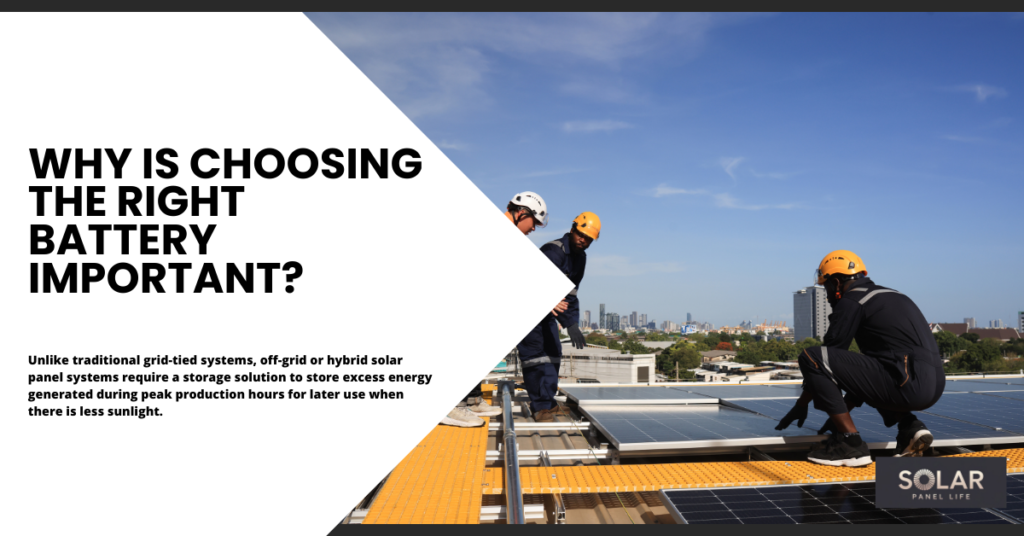Introduction
Solar energy has been gaining popularity over the years as a renewable source of energy. It is clean, abundant, and most importantly, free! However, to harness this energy and use it for various purposes, we need reliable and efficient batteries. Choosing the right battery for your solar setup can be a daunting task as there are various types available in the market.
In this article, we will discuss which battery is best for solar and guide you through their features, advantages, and suitability for different applications.
Why is Choosing the Right Battery Important?
Before diving into the types of batteries suitable for solar energy, it is essential to understand why choosing the right battery is crucial.
Solar panels convert sunlight into electrical energy during the day, and this energy needs to be stored for use during the night or on cloudy days. Batteries act as storage units, ensuring that the energy produced is not wasted and can be used when needed. Choosing the wrong battery can result in inefficient energy storage, leading to lower performance and higher costs in the long run.
One of the main reasons why choosing the right solar battery is important is because it directly impacts the overall performance and efficiency of your solar panel system. A good quality, properly sized solar battery can help maximize the amount of energy your system generates and stores, ultimately resulting in greater savings on electricity bills.
On the other hand, a low-quality or incorrectly sized battery can significantly reduce the system’s efficiency and shorten its lifespan, leading to additional costs and inconvenience in the long run.
Moreover, choosing the right solar battery also ensures a reliable power supply. Unlike traditional grid-tied systems, off-grid or hybrid solar panel systems require a storage solution to store excess energy generated during peak production hours for later use when there is less sunlight. This is where solar batteries come into play.

A reliable and efficient battery can store enough energy to power your household or business during times of low sunlight, making you less dependent on the grid and providing peace of mind during power outages.
In addition, installing the right solar battery also promotes sustainability. The main goal of switching to renewable energy sources like solar power is to reduce our carbon footprint and preserve the environment.
By choosing a high-quality solar battery, you are not only reducing your reliance on non-renewable energy sources but also contributing towards a cleaner and greener planet for future generations.
Another important aspect to consider when choosing the right solar battery is its lifespan. A good quality solar battery can last up to 10 years or even more with proper maintenance and care. This means that you will not have to worry about replacing or disposing of your battery frequently, reducing environmental impact and saving money in the long run.
Furthermore, the right solar battery can also help with load management. With advancements in technology, modern solar batteries now come equipped with features such as remote monitoring and load-shifting capability. These allow you to manage your energy consumption and reduce peak demand charges, ultimately resulting in further cost savings.
Last but not least, choosing the right solar battery also impacts your overall solar panel system’s safety. A good quality battery is designed with built-in safety features such as overcharge protection, temperature control, and short-circuit prevention. These features not only protect the battery itself but also ensure the safety of your household or business premises.

Types of Batteries for Solar
- Lead-Acid Batteries
Lead-acid batteries have been used for decades and are the most common type of battery used in solar setups. They come in two variants – flooded lead acid and sealed lead acid (SLA).
Flooded lead-acid batteries are more affordable, but they require regular maintenance, including checking water levels and adding distilled water when needed. On the other hand, SLA batteries are maintenance-free and have a longer lifespan than flooded lead-acid batteries. However, they come at a higher cost.
Lead-acid batteries have a lower upfront cost compared to other battery types, making them an attractive option for those on a budget. They also have excellent deep cycle capabilities, meaning they can be discharged and recharged multiple times without affecting their performance. This feature makes them ideal for off-grid solar systems.
- Lithium-Ion Batteries
Lithium-ion batteries have gained popularity in recent years thanks to their high energy density and longer lifespan compared to lead-acid batteries. They are also maintenance-free and have a higher efficiency rate, meaning they can store more energy produced by solar panels. However, they come at a higher cost than lead-acid batteries.
One of the significant advantages of lithium-ion batteries is their ability to charge and discharge quickly, making them suitable for high-energy demand applications. They also have a longer lifespan, with some models lasting up to 10 years, making them a cost-effective option in the long run.
- Saltwater Batteries
Saltwater batteries, also known as sodium-ion batteries, are a relatively new addition to the solar battery market. These batteries use a saltwater-based electrolyte solution instead of toxic chemicals found in traditional batteries, making them safer for the environment. They also have a longer lifespan and can withstand extreme temperatures.
Saltwater batteries have an excellent cycling ability, meaning they can be charged and discharged multiple times without affecting their performance. This feature makes them ideal for off-grid solar systems, especially in areas with harsh weather conditions.
Solar batteries are a crucial component of any solar power system. They store the energy generated by solar panels during the day so that it can be used at night or during cloudy weather when there is no direct sunlight. Choosing the right solar battery is essential as it directly impacts the efficiency and reliability of your solar power system.
When considering which solar battery to purchase, several factors need to be taken into account. These factors include battery type, size, capacity, warranty, and cost. In this guide, we will discuss each of these factors in detail to help you make an informed decision when choosing a solar battery.
Battery Type
The first factor to consider is the type of battery that best fits your solar power system. There are three main types of solar batteries: lead-acid, lithium-ion, and saltwater. Each type has its advantages and disadvantages, so it’s essential to understand each one before making a decision.
- Lead-acid batteries are the most commonly used in solar power systems. They are relatively inexpensive but have a shorter lifespan compared to other types of batteries.
- Lithium-ion batteries are more expensive but have a longer lifespan and higher efficiency. They also require less maintenance and have a faster charging time.
- Saltwater batteries are relatively new to the market and are known for their long lifespan, safety, and eco-friendliness. However, they are currently not as widely available as lead-acid or lithium-ion batteries.
It’s important to consider your budget, energy needs, and maintenance preferences when choosing a battery type for your solar power system.
Battery Size
After deciding on the type of battery, the next factor to consider is the size or capacity of the battery. Battery size is measured in kilowatt-hours (kWh) and refers to the amount of energy that can be stored in the battery. The size of the battery you need will depend on your energy usage and how many days of backup power you want in case of a power outage.
It’s important to note that larger batteries are more expensive, so it’s crucial to find a balance between capacity and cost. It’s also recommended to oversize your battery slightly to account for any future increases in energy usage or changes in weather patterns.
Battery Capacity
Battery capacity is another critical factor to consider when choosing a solar battery. It refers to the amount of energy that the battery can provide at a given time, measured in kilowatts (kW). A battery with a higher capacity can power more appliances simultaneously and for a longer period.
It’s essential to assess your daily energy usage and choose a battery with enough capacity to meet your needs. Keep in mind that the higher the capacity, the faster the battery will drain, so it’s crucial to have a balance between capacity and size.
Warranty
Solar batteries are a significant investment, and you want to ensure that they last for as long as possible. That’s why it’s essential to consider the warranty offered by the manufacturer. Most solar batteries come with a warranty of 5-10 years, but some may offer longer warranties.
It’s also important to read the fine print and understand what is covered under the warranty, as well as any conditions that may void it. This will give you peace of mind knowing that your investment is protected in case of any issues with the battery.
Cost
Finally, the cost of the solar battery is a crucial factor to consider. As mentioned earlier, different battery types have varying costs, and larger or higher-capacity batteries will also be more expensive. It’s essential to set a budget and research different options before making a decision.
While it may be tempting to go for the cheapest option, it’s important to remember that a solar battery is a long-term investment. A higher quality and more efficient battery may cost more upfront, but it will save you money in the long run by providing reliable backup power and lasting longer.
Applications of Solar Batteries
- Residential Use
Solar batteries are an excellent option for residential use, especially in areas with frequent power outages or high electricity costs. They can store excess energy produced during the day and provide backup power during nighttime or when there is no sunlight available. Lithium-ion and saltwater batteries are particularly suitable for residential use as they have a longer lifespan and higher efficiency rate.
- Off-Grid Use
Off-grid solar systems rely on batteries to store energy produced by solar panels for use when needed. This makes choosing the right battery even more crucial as it is the sole source of power in such setups. Lead-acid and saltwater batteries are suitable options for off-grid use as they have a high DOD and can withstand harsh weather conditions.
- Commercial Use
Solar batteries are also widely used in commercial applications, such as schools, hospitals, and businesses. They help reduce electricity costs and provide backup power during outages. Lithium-ion batteries are a popular choice for commercial use due to their high-efficiency rate and longer lifespan.
Apart from buildings, solar batteries are also used in off-grid areas where there is no access to traditional electricity. These systems can provide power for remote communities or disaster relief efforts. They can also be used in recreational vehicles, allowing campers and travelers to have a reliable source of energy while on the road.
The transportation industry is also taking advantage of solar batteries. Electric vehicles powered by solar energy are becoming increasingly popular, providing a cleaner and cheaper alternative to gasoline-powered cars. Solar buses and trains are also being implemented in some countries, reducing the carbon footprint of public transportation systems.
In addition to these practical applications, solar batteries also have numerous benefits for the environment. By using solar energy instead of fossil fuels, we can reduce our carbon emissions and mitigate the effects of climate change. Solar batteries also have a longer lifespan than traditional batteries, reducing the amount of waste produced.
The development of solar battery technology has also opened up opportunities for innovations. Researchers are constantly working on improving the efficiency and storage capabilities of solar batteries, leading to the possibility of using them in larger-scale applications such as powering entire cities or even countries.

